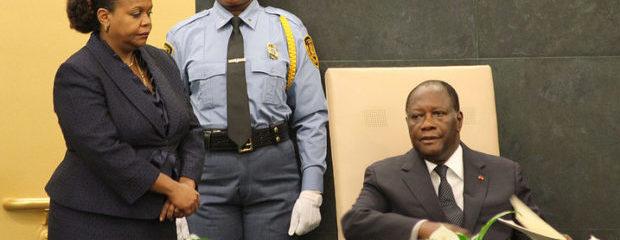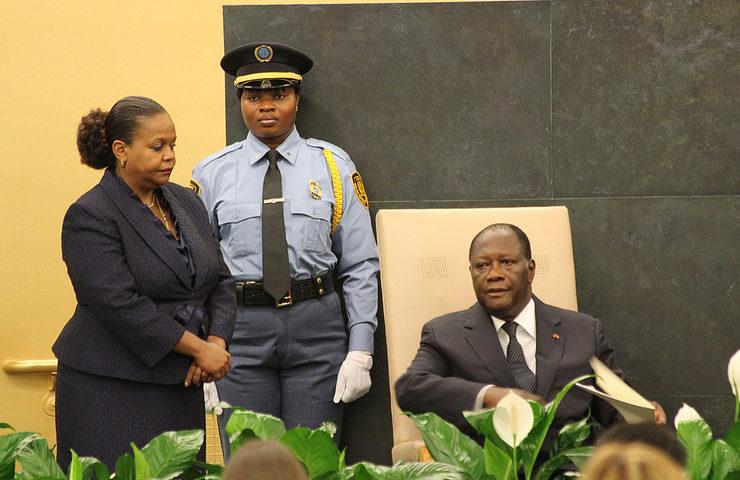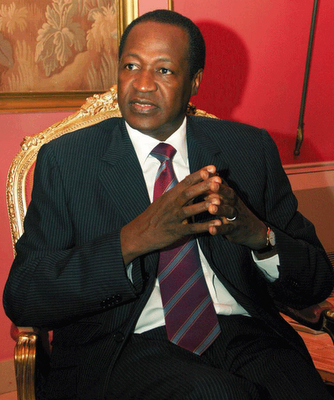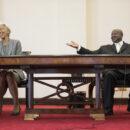Even if it passes, Côte d’Ivoire’s new constitution may not have any more legitimacy

The opposition has called for a boycott of the referendum on a new constitution this Sunday.

The opposition in Côte d’Ivoire claims the referendum process has been led by President Ouattara and not been inclusive. Credit: UNIC/Ivan Laca.
In May 2016, President Alassane Ouattara set up a committee of experts to propose a new constitution, following on from his promise during the 2015 presidential campaign.
One provision of the existing 2000 constitution is that it excludes citizens who are not born to two Ivoirian parents to run for president. This is a political issue because at least one of Ouattara’s parents is Burkinabé by birth. This would have disqualified him for the presidency, but the 2003 Linas-Marcoussis’ agreement – a deal aimed at ending the civil war that began in 2002 – removed these citizenship requirements temporarily, though that hasn’t stopped opposition parties referring to Ouattara’s election in 2010 and 2015 as illegitimate.
Amongst other things, the proposed constitution would make the change in citizenship rights permanent. It also includes the position of a vice-president, establishes a senate, and incorporates traditional leaders. On the face of it, it would seem good for post-conflict consolidation of constitutional principles.
However, there is already an effort by opposition leaders, including the Alliance of Democratic Forces, which represents 12 opposition parties, to boycott the referendum on 30 October. One of their concerns is the absence of a broad-based consultative process. Another is the short time-frame for Ivorians to debate the proposed constitution, which was unveiled to parliament on just 5 October.
What’s in the new constitution?
If the referendum is successful, presidential hopefuls will only need to have one Ivoirian parent, while strict residency requirements for candidates will also be eliminated.
However, this is part of a broader programme, which would guarantee citizenship for immigrants with one Ivoirian parent. Opponents suggest that this will strengthen the hand of immigrant communities which could achieve citizenship by mixed nationality marriages. This would cement a growing constituency for Ouattara and his allies.
The new constitution also allows the president to appoint a vice-president. But opposition parties see this move as a constitutional “coup” that could facilitate a succession plan in which Ouattara steps down before the end of his term and appoints his close ally Guillaume Soro, President of the National Assembly. There are also fears that establishing a vice-president’s post will lead to a greater centralisation of power.
In addition, there are fears that parliament’s power will be diluted under the new arrangement, opening open the door to more patronage positions. The proposed Article 87 establishes an upper house of parliament, with one-third of its senators directly appointed by the president and the remaining two-thirds elected. Critics say that this would provide non-elected presidential allies a clear path to Côte d’Ivoire’s representative body and would dilute representative parliament, which has been largely without opposition since 2001.
The new constitution also includes a National House of Traditional Chiefs and Kings, which could further diminish the power of elected representatives.
What citizens say
A 2014 Afrobarometer survey provides some indicators about what Ivoirians expect from their political system and the protection of their rights.
It found that 48% of those surveyed believed that the country was either “not a democracy” or “a democracy, with major problems”. The majority (55%) were not satisfied with how democracy works in the country.
What stands out is that the vast majority (82%) embraced the need to have a range of political parties in order to have choices. Yet, at the same time, 59% noted that opposition parties were silenced “always” or “often”.
The opposition is citing these concerns, as well as a lack of broad-based citizen and opposition consultation, as a reason to boycott the constitutional referendum.
There have also been peaceful demonstrations by opposition parties, though last week a protest was dispersed by state security forces and opposition leaders Mamadou Koulibaly and Aboudramane Sangaré were arrested.
As well as demonstrating against the organisation and deemed one-sidedness of the referendum, the protesters were also calling attention to things that both the proposed and current constitution have not upheld in practice: mainly the freedoms of assembly and speech.
Prospects for the proposed constitution
There are already growing concerns about the legality of the constitution referendum process. Aside from the problems of consultation, Ouattara is implementing the constitutional referendum with two separated ballot questions instead of a single proposal, seemingly in violation of the electoral code. This raises the likelihood that citizens may reconsider their position or become confused about the voting.
On Sunday, it is possible the proposed constitution will pass, but the range of controversies facing it suggest that even if it does, it is not apparent the new framework will have more legitimacy than the post-coup 2000 constitution. It may not settle the broader concerns of constitutional order. In fact, it may further delay much needed national reconciliation and consensus building in Côte d’Ivoire.
Abel Gbala, a Masters student in Communication for Development, Université Félix Houphouët-Boigny, contributed to this article.
Peter Penar, Researcher and PhD candidate in the Department of Political Science, Michigan State University
This article was originally published on The Conversation. Read the original article.![]()






Interesting article, and agree with much of this (although I think most commentators would say this constitution weakens rather than strengthens Soro’s future). In the current climate though, I think that the opposition would have been against this whatever the text said. Sometimes I think it’s not really about the text – before it was unveiled we had politicians campaigning for or against. Reconciliation is a very tricky process in a polarized society, and when the leaders aren’t willing, perhaps it’s not even possible until time helps us all move on.